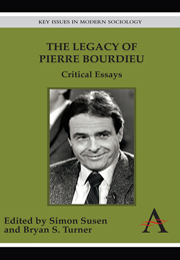Book contents
- Frontmatter
- Contents
- List of Contributors
- Introduction: Preliminary Reflections on the Legacy of Pierre Bourdieu
- 1 Between Structuralism and Theory of Practice: The Cultural Sociology of Pierre Bourdieu
- 2 Pierre Bourdieu: Unorthodox Marxist?
- 3 From Marx to Bourdieu: The Limits of the Structuralism of Practice
- 4 Durkheim and Bourdieu: The Common Plinth and its Cracks
- 5 With Weber Against Weber: In Conversation With Pierre Bourdieu
- 6 Bourdieu and Nietzsche: Taste as a Struggle
- 7 Elias and Bourdieu
- 8 Bourdieu and Adorno on the Transformation of Culture in Modern Society: Towards a Critical Theory of Cultural Production
- 9 The Grammar of an Ambivalence: On the Legacy of Pierre Bourdieu in the Critical Theory of Axel Honneth
- 10 Pierre Bourdieu and the Sociology of Religion
- 11 Bourdieu's Sociological Fiction: A Phenomenological Reading of Habitus
- 12 Overcoming Semiotic Structuralism: Language and Habitus in Bourdieu
- 13 Social Theory and Politics: Aron, Bourdieu and Passeron, and the Events of May 1968
- 14 Intellectual Critique and the Public Sphere: Between the Corporatism of the Universal and the Realpolitik of Reason
- 15 Practice as Temporalisation: Bourdieu and Economic Crisis
- Afterword: Concluding Reflections on the Legacy of Pierre Bourdieu
- Index of Names
- Index of Subjects
- Plate section
9 - The Grammar of an Ambivalence: On the Legacy of Pierre Bourdieu in the Critical Theory of Axel Honneth
Published online by Cambridge University Press: 05 March 2012
- Frontmatter
- Contents
- List of Contributors
- Introduction: Preliminary Reflections on the Legacy of Pierre Bourdieu
- 1 Between Structuralism and Theory of Practice: The Cultural Sociology of Pierre Bourdieu
- 2 Pierre Bourdieu: Unorthodox Marxist?
- 3 From Marx to Bourdieu: The Limits of the Structuralism of Practice
- 4 Durkheim and Bourdieu: The Common Plinth and its Cracks
- 5 With Weber Against Weber: In Conversation With Pierre Bourdieu
- 6 Bourdieu and Nietzsche: Taste as a Struggle
- 7 Elias and Bourdieu
- 8 Bourdieu and Adorno on the Transformation of Culture in Modern Society: Towards a Critical Theory of Cultural Production
- 9 The Grammar of an Ambivalence: On the Legacy of Pierre Bourdieu in the Critical Theory of Axel Honneth
- 10 Pierre Bourdieu and the Sociology of Religion
- 11 Bourdieu's Sociological Fiction: A Phenomenological Reading of Habitus
- 12 Overcoming Semiotic Structuralism: Language and Habitus in Bourdieu
- 13 Social Theory and Politics: Aron, Bourdieu and Passeron, and the Events of May 1968
- 14 Intellectual Critique and the Public Sphere: Between the Corporatism of the Universal and the Realpolitik of Reason
- 15 Practice as Temporalisation: Bourdieu and Economic Crisis
- Afterword: Concluding Reflections on the Legacy of Pierre Bourdieu
- Index of Names
- Index of Subjects
- Plate section
Summary
In the mid-1980s, Axel Honneth – successor to Jürgen Habermas, and now considered the most prominent representative of the Frankfurt School's third generation – made an important contribution to the sociophilosophical reading of Pierre Bourdieu's work that fundamentally shaped its German reception (see Behr, 2001). This contribution is marked by a clear ambivalence. On the one hand, it is obvious that it was in no way gratuitous. Honneth knew from the beginning that Bourdieu's work was to play a key role in his own project to renew the tradition of critical theory (Honneth, Basaure, Reemtsma and Willig, 2009). At the centre of this project was a reappropriation and revitalisation of the Hegelian concept of the ‘struggle for recognition’ (Honneth, 1995 [1992]; 2000; 2003; 2007 [2000]). On the other hand, Honneth's early texts, which contribute to the German reception of Bourdieu, are eminently critical of Bourdieu's work. In a monographic article presented in the early 1980s, Honneth (1984) advances the critique that Bourdieu's social theory tends to ignore the normative structuring of social life and instead takes up a utilitarian, strategic understanding of social action. This charge similarly dominates the interview Honneth and his colleagues conducted with Bourdieu, which was published two years later (Bourdieu, Honneth, Kocyba and Schwibs, 1986). I want to argue that this ambivalence cuts across Honneth's entire relationship with Bourdieu's work. Whilst Honneth rejects what he considers to be the socio-ontological foundations of Bourdieu's sociological theory, he draws upon the Bourdieusian approach and considers it as an expression of an exemplary sociology.
- Type
- Chapter
- Information
- The Legacy of Pierre BourdieuCritical Essays, pp. 203 - 222Publisher: Anthem PressPrint publication year: 2011
- 2
- Cited by



